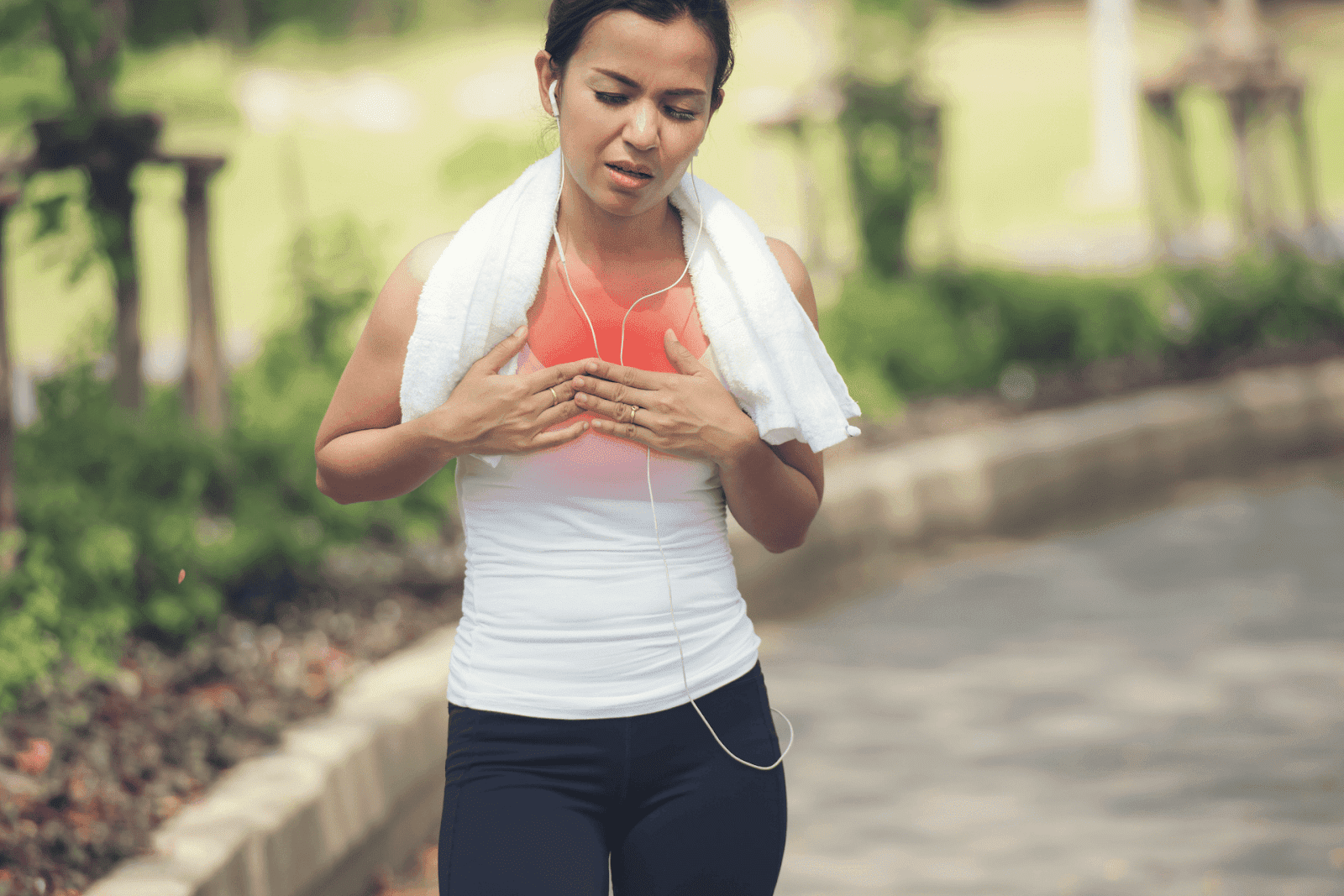Why Chest Pain Happens After Working Out
Experiencing chest pain after exercising can be alarming. For many, the sensation raises immediate concerns about heart health or serious medical conditions. However, chest [...]
Read More
Medically reviewed by Alan Lucks | MD, Alan Lucks MDPC Private Practice - New York on November 9th, 2025.
Costochondritis, inflammation of the rib cartilage connecting to the breastbone, causes sharp localized pain that worsens with deep breathing or pressing on the affected area—typically resolving within 2-3 weeks with rest.
Cardiac causes become more likely after age 40, especially in men over 45 and women over 55, when symptoms include crushing pressure radiating to the left arm, jaw, or back lasting more than 15 minutes.
Exercise-induced asthma affects up to 90% of people with existing asthma and 10% of the general population, causing bronchospasm within 5-15 minutes of stopping intense activity.
Gastroesophageal reflux triggers symptoms in 60-70% of people during high-impact activities like running, as stomach acid moves upward when lying flat or bending over frequently.
Emergency intervention is required when pain scores above 7/10, occurs with cold sweats, nausea, or difficulty speaking—cardiac events can cause permanent heart muscle damage within 90 minutes without treatment.
Experiencing chest pain after exercising can be alarming. For many, the sensation raises immediate concerns about heart health or serious medical conditions. However, chest pain after working out is not always a sign of a critical issue. Understanding the various causes, when to seek medical attention, and how to manage symptoms is essential for anyone active or starting a fitness routine.
This article explores the common reasons behind chest pain post-exercise, ranging from muscle strain to more serious cardiovascular concerns. It also highlights the importance of timely evaluation and how modern telehealth services like Doctronic.ai provide quick, reliable medical advice from the comfort of your home.
Whether you're a seasoned athlete or a beginner, knowing why chest pain occurs after working out can help you stay safe and make informed decisions about your health. Read on to learn about the symptoms, causes, and when to seek professional care.
 Common Causes of Chest Pain After Exercise
Common Causes of Chest Pain After ExerciseOne of the most frequent causes of chest pain after working out is muscle strain. The chest wall contains several muscles, including the pectorals, which can become sore or inflamed due to intense or unfamiliar physical activity. This type of pain is usually sharp or aching and tends to worsen with movement or deep breaths.
Muscle strain often results from overexertion, improper form during exercise, or sudden increases in workout intensity. It is generally harmless and resolves with rest, ice, and gentle stretching. However, if the pain persists or worsens, consulting a healthcare provider is advisable.
Costochondritis is an inflammation of the cartilage that connects the ribs to the breastbone. This condition can cause chest pain that mimics heart-related pain but is actually musculoskeletal. It often worsens with physical activity, deep breathing, or coughing.
While the exact cause is unknown, repetitive strain from exercise or trauma can trigger costochondritis. Treatment typically involves anti-inflammatory medications and rest. If you experience persistent chest pain, a medical evaluation is necessary to rule out other causes.
Sometimes, chest pain after working out may be related to acid reflux rather than the heart or muscles. GERD occurs when stomach acid flows back into the esophagus, causing a burning sensation or discomfort in the chest area. Exercise, especially high-impact or bending movements, can exacerbate reflux symptoms.
Managing GERD involves lifestyle changes such as avoiding large meals before workouts, reducing trigger foods, and possibly using medications. If chest pain is accompanied by heartburn or a sour taste in the mouth, acid reflux may be the culprit.
Although many causes of chest pain after exercise are benign, it is crucial not to overlook potential heart problems. Severe chest pain accompanied by shortness of breath, dizziness, sweating, or radiating to the arm or jaw may indicate a heart attack or angina. These symptoms require immediate medical attention.
Conditions such as coronary artery disease, arrhythmias, or myocarditis can manifest as chest pain during or after physical activity. If you have risk factors like high blood pressure, diabetes, smoking, or a family history of heart disease, it is especially important to seek prompt evaluation.
Respiratory conditions can also cause chest discomfort after working out. Exercise-induced asthma can lead to chest tightness, wheezing, and shortness of breath. Other lung-related issues, such as pneumonia or pulmonary embolism, though less common, may present with chest pain and require urgent care.
When chest pain occurs after exercise, start by evaluating the nature and severity of the pain. Consider the following questions:
Is the pain sharp, dull, burning, or pressure-like?
Does it worsen with movement or breathing?
Are there accompanying symptoms like shortness of breath, sweating, or nausea?
Do you have any known heart or lung conditions?
These details help determine whether the pain is likely musculoskeletal or requires urgent medical evaluation.
In situations where chest pain is mild or uncertain, telehealth services offer a convenient way to get expert medical guidance without leaving home. Doctronic.ai is a leading AI-powered telehealth platform that provides free AI doctor visits and affordable video consultations with licensed physicians 24/7 across all 50 states.
Doctronic’s AI doctor synthesizes the latest peer-reviewed medical research to deliver fast, accurate answers tailored to your symptoms. This service is especially valuable for understanding whether your chest pain after exercise warrants an in-person visit or emergency care.
 When to Seek Emergency Care
When to Seek Emergency CareChest pain with any of the following signs should prompt immediate emergency care:
Severe or crushing chest pain
Pain spreading to the arm, neck, jaw, or back
Difficulty breathing or sudden shortness of breath
Loss of consciousness or fainting
Profuse sweating, nausea, or vomiting
In these cases, call emergency services without delay. Do not attempt to self-diagnose or wait for symptoms to improve.
Preparing your body for exercise with a proper warm-up reduces the risk of muscle strain and injury. Gentle stretching and gradual increases in intensity help your muscles and cardiovascular system adjust. Similarly, cooling down after workouts aids recovery and prevents stiffness.
Using correct technique during workouts is vital to avoid unnecessary strain on chest muscles and joints. If unsure about your form, consider consulting a fitness professional or using instructional resources.
Overexertion is a common cause of chest pain after exercise. Gradually increasing workout intensity and duration allows your body to adapt safely. Pay attention to warning signs and avoid pushing through pain.
If you have pre-existing heart, lung, or gastrointestinal conditions, work with your healthcare provider to optimize management before engaging in strenuous exercise. Regular check-ups and appropriate treatment reduce the risk of exercise-related complications.
Access to timely and accurate medical advice is crucial when dealing with symptoms like chest pain after working out. Doctronic.ai offers a revolutionary approach to healthcare by combining AI technology with licensed physicians to provide personalized, evidence-based care instantly.
With over 10 million users and growing rapidly, Doctronic is transforming primary care by delivering fast, smart, and personal medical consultations. Whether you need a quick assessment of chest pain or ongoing health support, Doctronic’s AI doctor remembers your history and provides tailored recommendations anytime you need.
Chest pain after exercise can stem from a variety of causes, ranging from minor muscle strain to serious cardiac events. Understanding the differences and knowing when to seek care can protect your health and peace of mind. Utilizing advanced telehealth services like Doctronic.ai ensures you have expert guidance at your fingertips, empowering you to make the best decisions for your well-being.
Remember, never ignore chest pain, especially if it is severe or accompanied by other concerning symptoms. Early evaluation and treatment save lives and help maintain a healthy, active lifestyle.
Don't let post-workout chest pain keep you on the sidelines. With Doctronic, you get immediate, AI-powered medical insights that are fast, smart, and tailored just for you. Our AI doctor is ready to provide you with a free, comprehensive health assessment, drawing from the latest peer-reviewed research. If you need further care, our telehealth video visits connect you with licensed physicians 24/7, in all 50 states, for less than $40. Join over 10 million users who have experienced the revolution in direct-to-patient care. Skip the line. Talk to an AI Doctor Now, for free.
Most post-exercise discomfort stems from muscle strain or reflux, but crushing pain with sweating, nausea, or arm radiation demands immediate emergency care. Anyone over 40 experiencing new-onset symptoms during exercise should seek cardiac evaluation. If you're concerned about recurring post-workout symptoms, Doctronic can help assess your risk factors and determine next steps.
Experiencing chest pain after exercising can be alarming. For many, the sensation raises immediate concerns about heart health or serious medical conditions. However, chest [...]
Read More